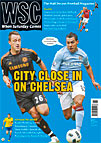 Ian Rands looks at the mixed results of the extensive efforts to export the Sheffield United brand around the world
Ian Rands looks at the mixed results of the extensive efforts to export the Sheffield United brand around the world
If I was to tell you that there is an English football club developing a global brand that currently encompasses five clubs on three continents, including the first foreign investment in a Chinese team, I suspect that Sheffield Utd will not be the first club that comes to mind. You might also be surprised to hear that other interests include sponsorship of an Indian football academy and an advisory role with the Syrian FA. Over the last four years this “global Blades family” has developed apace, but not without a few problems along the way and a lingering degree of cynicism among United fans.
From the outside looking in, the fans see a fractured “family” with seemingly little benefit for the club at the centre of it all. Those investments perceived to be potentially profitable, in former Hungarian giants Ferencvaros and A-League side Central Coast Mariners, are held outside the club as part of the Scarborough Group – chairman Kevin McCabe’s business.
It may be that they are better held there because of the stadium and leisure developments that are planned alongside investment. However, following promotion back to the top tier of Hungarian football, reaching the UEFA Cup or Champions League preliminary stages are imminent possibilities for Ferencvaros, and the Mariners qualified for the Asian Champions League in 2009.
Meanwhile, Chengdu Blades, a Chinese Super League club majority-owned by Sheffield United plc, contributed a £2 million loss to the 2009 accounts and subsequently suffered the ignominy of being demoted to the second division due to their part in a match-fixing scandal. A change of club officials took place and, when asked at a fans’ forum in the summer why United are significantly cutting their cost base while propping up a loss-making Chinese club, McCabe confirmed that the nature of this investment had changed as well.
The club management/player-development agreements that are put in place appear to be a means of shipping off Blades youngsters who have not made the grade, with no players arriving in the opposite direction. Only Matthew Lowton has returned, from a spell in Hungary, to figure in the Sheffield Utd first team. A partnership with White Star Woluwe of the Belgian third division, close to McCabe’s Brussels home, was seen as a potential holding club for players who have work permit difficulties. So far, assorted Jamaican and Trinidadian players have been placed there, with some signing for Ferencvaros but none moving on to South Yorkshire.
One of the most prestigious potential club tie-ups failed to happen – in 2007 United were in advanced negotiations with São Paulo on an agreement which would have seen young Brazilian players gain experience in English football. Unfortunately, the Blades’ key contact passed away and, with him, the opportunity of a link-up.
This summer the Blades were more successful, brokering an agreement with Copa Libertadores champions Estudiantes. The appeal to fans was high, with former hero Alex Sabella coaching Estudiantes, and a prestigious friendly was arranged. However, the absence of Sabella, who was reportedly in negotiations for the national coaching role (see WSC 284), and a team largely comprising youth players failed to ignite the imagination of the Blades’ support and attendance was poor.
It has been a bumpy ride, but McCabe clearly believes that the structure he has put in place provides clear opportunities for global sponsorship deals, and some of these are now in place. A property consultancy business is providing services on the new Ferencvaros stadium, as well as sponsorship on the back of United and Ferencvaros shirts. A global betting company have signed their first deal outside of the Premier League with United, reportedly on the back of our global spread. No values are disclosed for these deals, but it’s implied that they are significant. However, what might seem more simple deals, such as kit manufacturing, are not in place. This was always unlikely with Reebok holding an exclusive collective deal with the A-League, but there is no global deal with the other partner clubs.
All this is happening at a time when McCabe is actively seeking to take a step back from his day-to-day involvement in the club, reduce his ongoing financial obligations and seek new investment partners. With United in talks with several potential investors, maybe the result of this global positioning is close to fruition.
McCabe has previously said that any new investment will be directed to enhancing the Blades playing squad. With a disappointing start to the season for United and the most positive news story on the club website in recent weeks being the promotion of Chengdu Blades, it might well need such investment for the fans to acknowledge the foresight and determination of Kevin McCabe to make his global vision work. After all nobody really believed he was going to be successful in his compensation claim for the Tévez affair, did they?
From WSC 285 November 2010